
The unusually sharp decline in the yuan in the recent days, which has caught many investors off guard, has given rise to speculation that a policy shift is taking place in the mainland.
The currency has depreciated 0.5 percent against the U.S. dollar over the past two weeks. It traded around 6.094 against the greenback on Monday, extending its worst weekly performance in more than two years, after the People's Bank of China (PBoC) fixed the daily mid-point lower for a fifth straight session.
"Chinese officials have played down the drop in the CNY (traded onshore) and CNH (traded offshore) but nonetheless, markets are seeing it as a major shift in policy following recently weaker economic data," said Mitul Kotecha, global head of currency strategy and global markets research for Asia at Crédit Agricole.
"By abruptly reversing the appreciation trend, there is a sense China wants to implement more two-way risk in the currency. They don't want the market to see the currency as a one-way bet," he said, noting that market positioning had become heavily long the currency. The yuan has attracted considerable foreign investor demand over recent years on its steady appreciation and relative stability.
The central bank set the mid-point at 6.1189 on Monday versus the dollar up from 6.1176 on Friday. The dollar/yuan exchange rate may rise or fall 1 percent from the mid-point each day.
Louis Kuijs, chief China economist at RBS agreed that recent depreciation in the currency indicates that the PBoC is keen to move to more exchange rate flexibility - in line with its reform strategy on monetary and financial policy.
"The PBoC has for a while been trying to move away from the current 'one-way risk' situation on the FX market - which triggers additional inflows - towards one where the markets think that the exchange rate can also depreciate," Kuijs said.
"We think the PBoC is keen to use moments of relative yuan weakness to allow and encourage market pressures temporarily push the yuan to a more depreciated level," he said.
(Read more: Yuan now one of world's most tradable currencies)
While the FX market is normally in surplus, once in a while, when net financial flows are negative, market pressures could temporarily be in the direction of depreciation, he explained.
"The trade surplus may have temporarily been low in February because of the Chinese New Year effect. In addition, it is possible that net financial outflows were substantial in February," he said.
Where's the currency headed?
According to Kuijs, movement to true two-way risk will take time given the large structural surplus on its FX market. In the fourth quarter, China's total underlying flow of FX reserves accumulation was $131 billion.
(Read more: Yuan takes another step forward as a world currency)
"While we may well see a few more temporary episodes of yuan depreciation, we expect the fundamental FX market pressures to lead to a trend of further yuan appreciation," he said.
Khoon Goh, senior FX strategist at ANZ said while further position squeezes could lead to short-term weakness in the yuan, he also expects the currency will appreciate to reach 5.98 by year-end.
Watch the yuan mid-point fixing
Despite recent weaker CNY fixes by the PBoC, there has been no "unusual" fixing activity by the central bank, he said.
Nevertheless, Goh said said he will be on the lookout for such activity as it could be a precursor to the widening of the yuan's trading band.
The PBoC last week said it is planning to widen the trading band this year in an "orderly" manner as it moves toward a more convertible currency.
(Read more: )
"In the lead-up to the April 2012 band widening, the PBoC started to weaken the fix more than what was expected. So perhaps we could be in for a repeat, with the PBoC seeking to engineer a weaker spot rate and bringing it closer towards the fix in preparation for band widening," Goh said.
—By CNBC's Ansuya Harjani. Follow her on Twitter @Ansuya_H


